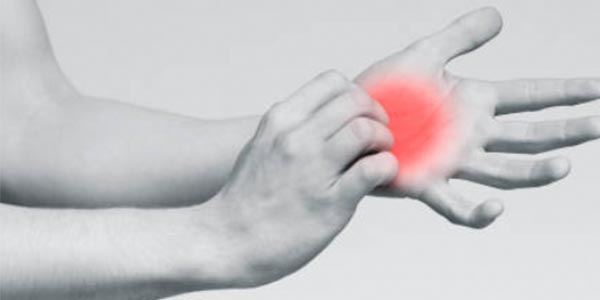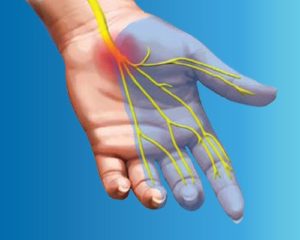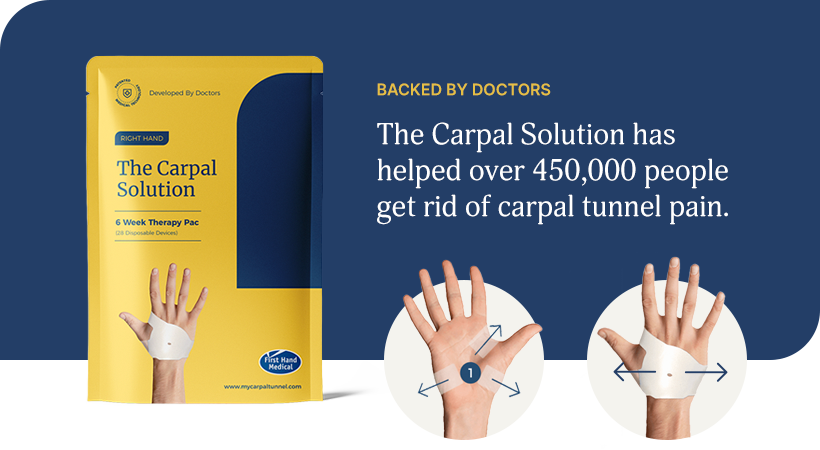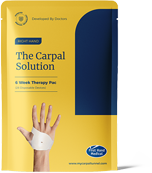Are Itchy Palms a Symptom of Carpal Tunnel Syndrome?
Itchy palms alone don’t necessarily indicate carpal tunnel syndrome. But if you have other carpal tunnel symptoms, that itch might help you get a CTS diagnosis.


By The Carpal Solution Medical Team Over 300 years combined medical experience

Are Itchy Palms a Symptom of Carpal Tunnel Syndrome?
Itchy palms alone don’t necessarily indicate carpal tunnel syndrome. But if you have other carpal tunnel symptoms, that itch might help you get a CTS diagnosis.


By The Carpal Solution Medical Team Over 300 years combined medical experience

Itching palms isn’t one of the well-known symptoms of carpal tunnel syndrome, but it’s not an unusual one either.
In this post, we’ll talk about the reasons your palms may itch. We’ll also explain how you may be able to tell whether your itching palms are a symptom of this overuse condition. Finally, we’ll explore how you can start getting relief from CTS without surgery.
Why are my palms itchy?
Itching, or pruritis, is a common symptom that can be caused by myriad conditions. So don’t jump to any diagnostic conclusions if this is the only hand-related complaint you have.
The most common causes of itching palms and itchy skin are dry skin and skin allergies.
Especially in our post-COVID-19 world, constant hand-washing can damage the skin’s natural oil barrier and healthy pH balance. Damaged skin dries out, cracks, and may feel itchy.
We also handle more materials, substances, and chemicals than ever before. Reactions to latex, wool, synthetic materials, household cleaners, even the soaps and lotions you use to “care” for your skin can cause itching.
What’s more, certain medications may make your skin itch. People with diabetes often experience itchiness too. So medical treatments and conditions might be behind those itchy hands.
And one of those medical conditions that cause itching palms is carpal tunnel syndrome. Because carpal tunnel syndrome is a nerve condition, it can lead to myriad symptoms.
Each CTS patient may experience different symptoms. To help you understand why and help you determine whether your itchy palms are related to carpal tunnel syndrome, we’ll explain the condition in more detail.

How carpal tunnel syndrome can cause itching palms
Hand anatomy is complex. In brief, the carpal tunnel is an actual tunnel formed by the wrist bones and a ligament known as the transverse carpal ligament. The nerve that runs through the carpal tunnel (along with some tendons) is the median nerve. This nerve runs from the fingertips to the cortex at the base of the brain.
In carpal tunnel syndrome, the median nerve becomes pinched or pressed. This irritation is usually caused by one or two factors.
- First, the soft tissue around the carpal tunnel can become injured from repetitive stress or a sudden impact. The tissue loses its flexibility and causes a pinching action in this tight anatomical space.
- Second, the injured soft tissue in the heel of the hand and the wrist becomes inflamed and swells with lymphatic fluid. This extra fluid gets trapped in the carpal tunnel and creates pressure on the nerve. This is why carpal tunnel syndrome falls into a category of medicine called “nerve entrapment.”

This pressure also restricts blood circulation, making it impossible for the body to heal itself naturally. The low blood circulation can’t clear out the inflammation and return the body to its natural healing processes without outside help.
Pinched nerves can often produce unexpected signs or symptoms. So both uncommon and common carpal tunnel symptoms can manifest anywhere in the body along the median nerve’s path.
As carpal tunnel progresses, symptoms often present in unpredictable ways. Some of these include what patients describe as electrical shocks shooting up their forearms. Other patients describe symptoms such as burning pain, an aching neck, or, yes, tingling or itching palms.
How to know if your itchy palms mean carpal tunnel syndrome
If you use your hands repetitively and suspect you might have carpal tunnel syndrome, don’t rule out or ignore any symptoms that follow the median nerve. Anything affecting this nerve can in turn affect any muscle, joint, or other anatomical structure along its path.
When it comes to nerve entrapment and pain, there are hundreds of possible combinations of symptoms. This can make it difficult for the average general-practice doctor to make a solid diagnosis with confidence.

Another example of the unpredictable nature of carpal tunnel is symptoms such as shoulder pain, elbow pain, or itching palms. These symptoms often cause patients to doubt that they have CTS. But these symptoms, although less common, are fairly routine symptoms of this debilitating and frustrating hand condition.
A neurologist can perform a nerve conductivity study and give a definitive diagnosis. However, this procedure can be expensive and painful.
Most people don’t need to have a nerve conductivity study unless they have conflicting symptoms or are considering surgery. Surgeons request the nerve conductivity study for health insurance reimbursement.
So if the only complaint you have is itching palms, your general practitioner can assess you and refer you to the right specialist, be it a hand specialist, dermatologist, or allergist. If you have itchy palms AND pain, tingling, or numbness in the fingers, hands, wrists, arms, elbows, shoulders, or neck, it’s worth getting a definitive diagnosis of carpal tunnel syndrome so you can get treatment for it.
What you should do now?
To sum up, itching palms can be one of the less common symptoms of carpal tunnel syndrome. If you have itching palms, visit our CTS Symptoms page for more information. This simple method of self-diagnosis can help you determine whether you may have CTS.
If you believe you have carpal tunnel syndrome, you can begin treating your pain and discomfort at home with doctor-advised hand stretching. Our own Carpal Solution offers passive nighttime stretching that’s painless, inexpensive, and convenient.

Treatment for carpal tunnel syndrome and itching palms
Many people who are diagnosed with CTS immediately think they need to have surgery. Although the body does need help to overcome nerve entrapment in the carpal tunnel, carpal tunnel surgery is an extreme measure. Given its risks and potential for scar tissue formation and complications, carpal tunnel surgery is a last-resort treatment for carpal tunnel nerve entrapment.
It may surprise you to learn that gentle, consistent stretching under a doctor’s direction for 220 hours over a six-week period is the best way to put carpal tunnel into remission. So you can see that there’s a much better way to treat less common carpal tunnel symptoms such as itchiness on the palms, back of the hands, or forearms.
 Created by renowned Harvard health care professionals.
Created by renowned Harvard health care professionals. 








